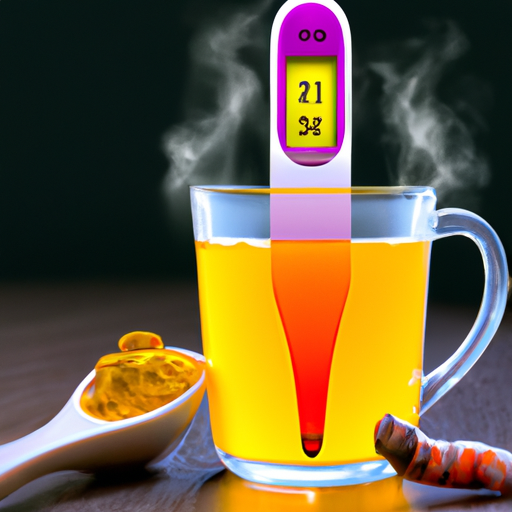If you’re interested in improving the health of your liver, you might be considering whether turmeric tea is a beneficial choice. The liver plays a vital role in filtering toxins from the body, creating bile, and processing nutrients, among other important functions. Therefore, taking care of its well-being is key to maintaining overall health.
Turmeric tea is a popular herbal beverage that has been used for centuries in traditional medicine to treat a variety of ailments, including liver problems. But does it really work? In this article, we’ll take an evidence-based look at the potential benefits and drawbacks of turmeric tea for liver health, as well as other natural remedies and lifestyle changes that may support your liver function.
First, we’ll explore the basics of liver health and the role of turmeric tea in promoting it. Then, we’ll delve into the scientific research on turmeric tea and liver health, as well as other natural remedies that may help keep your liver in top shape. Finally, we’ll discuss precautions and side effects of turmeric tea, as well as how to make it and incorporate it into your diet.
By the end of this article, you’ll have a better understanding of whether turmeric tea is a good choice for your liver health and what other steps you can take to support this vital organ.
Key Takeaways
- Turmeric tea contains curcumin, which has antioxidant and anti-inflammatory properties that can protect the liver from damage caused by toxins and decrease the risk of liver cancer.
- Milk thistle, dandelion root, and artichoke are herbs that have potential benefits to liver health, including antioxidant, anti-inflammatory, and liver detoxification properties.
- Symptoms of liver damage can be difficult to identify, making it important to take proactive steps to maintain liver health, such as consuming natural liver detoxifiers and maintaining a healthy lifestyle overall.
- Turmeric tea precautions include avoiding it if you have a history of liver disease or gallstones and consulting with a healthcare professional before consuming it regularly due to potential side effects and interactions with certain medications.
Understanding the Importance of Liver Health
You can’t afford to neglect your liver health – it’s essential for your overall well-being. Your liver plays a crucial role in your body by detoxifying harmful substances and filtering out toxins. The importance of liver detoxification cannot be overstated, as it helps to keep your body functioning properly and prevents the accumulation of harmful substances.
Symptoms of liver damage can be difficult to identify, which is why it’s important to take proactive steps to maintain your liver health. Some common symptoms of liver damage include fatigue, nausea, abdominal pain, and yellowing of the skin or eyes. If you experience any of these symptoms, it’s important to seek medical attention as soon as possible.
Now, let’s move on to the next section and talk about what turmeric tea is and whether it can help support liver health.
What is Turmeric Tea?
Like a warm sunrise on a chilly morning, sipping on this golden elixir can provide a comforting start to your day. Turmeric tea, also known as golden milk, is a beverage made by steeping turmeric in hot water or milk.
Consumed for centuries in traditional Indian medicine, turmeric tea has gained popularity in recent years due to its potential health benefits. The benefits of drinking turmeric tea are numerous. Turmeric contains curcumin, a compound known for its antioxidant and anti-inflammatory properties. Studies have shown that curcumin may help improve brain function, reduce the risk of heart disease, and even prevent certain types of cancer.
When buying turmeric for tea making, it’s important to look for high-quality, organic turmeric powder. Store it in an airtight container in a cool, dry place to preserve its flavor and potency.
Turmeric tea has many potential health benefits, including for liver health. But how does turmeric tea affect the liver? Let’s explore in the next section.
How Does Turmeric Tea Affect the Liver?
The effects of regularly consuming this golden elixir on liver function have been studied and are worth exploring. Turmeric tea benefits the liver in many ways, including liver disease prevention, reducing inflammation, and increasing antioxidant levels. A study conducted on rats found that curcumin, the active ingredient in turmeric, can protect the liver from damage caused by toxins. Turmeric tea can also decrease the risk of liver cancer by suppressing the growth of cancer cells.
To further understand the effects of turmeric tea on the liver, take a look at the table below:
| Turmeric Tea and Liver Health | Benefits |
|---|---|
| Reduces inflammation | Decreases liver inflammation and damage |
| Increases antioxidant levels | Protects liver cells from oxidative stress |
| Liver disease prevention | Decreases the risk of liver disease |
| Suppresses cancer cell growth | Decreases the risk of liver cancer |
As you can see, turmeric tea has several benefits for liver health. Scientific research on turmeric tea and liver health has shown promising results, indicating that this beverage may be a valuable addition to a liver-healthy diet.
Scientific Research on Turmeric Tea and Liver Health
If you’re interested in learning more about the effects of turmeric tea on liver health, you’ll be glad to know that there’s a fair amount of scientific research available on the topic.
Studies have shown that the active compound in turmeric, curcumin, can help to lower liver enzymes and reduce inflammation.
Additionally, clinical trials have demonstrated that curcumin supplementation may be beneficial for patients with liver disease.
Studies on Curcumin’s effects on liver enzymes
Research shows that curcumin, found in turmeric, can potentially improve liver function by reducing inflammation and decreasing liver enzyme levels. In a study published in the journal Phytotherapy Research, researchers found that taking curcumin supplements for 12 weeks significantly reduced liver enzyme levels in people with non-alcoholic fatty liver disease.
Another study published in the Journal of Clinical Gastroenterology found that curcumin improved liver function in people with chronic hepatitis B. While these studies show promising results, more research is needed to determine the long-term effects of turmeric on liver health.
It’s important to note that these studies were conducted on a small scale and further clinical trials on liver disease patients are necessary to confirm the effectiveness of curcumin in improving liver function.
Clinical trials on liver disease patients
Now that we have looked at the effects of curcumin on liver enzymes, let’s delve into clinical trials conducted on liver disease patients. These trials have shown promising results in terms of the benefits of turmeric tea for liver health. In a study published in the Journal of Clinical Gastroenterology, researchers found that patients with non-alcoholic fatty liver disease who took curcumin supplements for 8 weeks had significant improvements in liver function tests compared to those who received a placebo.
Additionally, another study published in the World Journal of Gastroenterology found that curcumin supplementation for 12 weeks improved liver function in patients with chronic hepatitis B. These results suggest that turmeric tea may have long-term effects on liver health and can be a helpful natural remedy for those with liver disease. It is important to note, however, that more research is needed to determine the optimal dosage recommendations for turmeric tea and its effects on liver health.
| Emotion | Reason | Action |
|---|---|---|
| Hopeful | The clinical trials on liver disease patients showed improvements in liver function | Consider incorporating turmeric tea into your daily routine |
| Cautious | Further research is needed to determine optimal dosage recommendations | Consult with your healthcare provider before starting any new supplement or natural remedy |
Moving forward, let’s explore other natural remedies for liver health.
Other Natural Remedies for Liver Health
You may be interested to learn about other natural remedies for liver health. Milk thistle, dandelion root, and artichoke are all herbs that have been studied for their potential benefits to liver health.
Milk thistle has been found to have antioxidant and anti-inflammatory properties, while dandelion root may help improve liver function and reduce inflammation.
Artichoke has also been shown to have antioxidant properties and may aid in liver detoxification.
Milk Thistle
Milk thistle, also known as Silybum marianum, is a natural herb that has been used for centuries to support liver health and is commonly found in liver detox supplements. Herbal supplements have been a popular method for liver detoxification, and milk thistle is one of the most commonly used herbs for this purpose. A recent study showed that a milk thistle supplement improved liver function in patients with chronic liver disease.
To give you a clearer picture, here is a table outlining the potential benefits of milk thistle for liver health:
| Benefit | Evidence |
|---|---|
| Improves liver function | A study showed that a milk thistle supplement improved liver function in patients with chronic liver disease. |
| Protects liver cells | Studies suggest that milk thistle can protect liver cells from damage caused by toxins. |
| Reduces inflammation | Milk thistle has anti-inflammatory properties that may help reduce inflammation in the liver. |
| May improve insulin resistance | Some studies suggest that milk thistle may help improve insulin resistance, which is often linked to liver disease. |
| May help prevent liver cancer | Preliminary studies suggest that milk thistle may have anti-cancer properties that could help prevent liver cancer. |
As you can see, milk thistle has a lot of potential benefits for liver health. Moving on, let’s take a look at another natural remedy for liver health – dandelion root.
Dandelion Root
Dandelion root, a common weed found in many parts of the world, has been used for centuries as a natural remedy for various health conditions, including liver health. The roots of the dandelion plant are rich in vitamins and minerals such as iron, calcium, and potassium, and have been shown to have anti-inflammatory properties. Studies have suggested that dandelion root benefits may include improving liver function, reducing liver inflammation, and protecting against liver damage.
One way to incorporate dandelion root into your diet is through drinking dandelion root tea. Dandelion root tea recipes can be found online or in health food stores, and typically involve steeping the dried root in hot water for several minutes. While more research is needed to fully understand the benefits of dandelion root for liver health, incorporating it into your diet may be a natural way to support a healthy liver.
Moving onto the next subtopic, let’s take a look at the potential benefits of artichoke for liver health.
Artichoke
If you’re looking for a flavorful and nutritious addition to your diet, consider adding artichoke to your meals. Not only is it low in calories and high in fiber, but artichokes also contain antioxidants that are beneficial for overall health. Additionally, it may even have potential benefits for your liver health.
Research suggests that artichoke extract may help to improve liver function and protect against liver damage. This is thanks to its high concentration of antioxidants, which can help to reduce inflammation and oxidative stress in the liver.
Artichoke can be enjoyed in a variety of ways, from roasted artichoke hearts to artichoke dips and salads. Incorporating this vegetable into your diet may be a simple and delicious way to support your liver health.
As you move on to the subsequent section about ‘precautions and side effects of turmeric tea,’ keep in mind that while turmeric has been shown to have potential benefits for liver health, it’s important to be aware of any potential risks or interactions with medications.
Precautions and Side Effects of Turmeric Tea
Be careful when drinking turmeric tea because it can cause side effects that may harm your liver, so make sure to consult with a healthcare professional before consuming it regularly. Some of the turmeric tea precautions include avoiding it if you have a history of liver disease or gallstones.
Additionally, turmeric tea may interact with certain medications, such as blood thinners and diabetes medications, so it’s important to speak with a healthcare provider to ensure it is safe for you to consume.
Turmeric tea side effects may also include stomach discomfort, nausea, and diarrhea. While these side effects are typically mild and temporary, it’s important to monitor how your body responds to the tea.
It’s also important to note that consuming too much turmeric may lead to iron deficiency anemia, as it can interfere with iron absorption. With these precautions and side effects in mind, it’s important to speak with a healthcare professional before incorporating turmeric tea into your routine.
Now, let’s move on to the exciting part: how to make turmeric tea!
How to Make Turmeric Tea
Get ready to add a burst of sunshine to your day with this golden elixir that’ll warm you up from the inside out. Turmeric tea has been used for centuries in traditional medicine for its anti-inflammatory and antioxidant properties. Research suggests that turmeric tea benefits may include improved liver function, reduced inflammation, and improved cognitive function.
To make the best turmeric tea recipe, start by boiling 4 cups of water. Add 1 teaspoon of ground turmeric, 1 teaspoon of grated ginger, and a pinch of black pepper to the water. Let it simmer for 10 minutes, then strain the mixture and add honey or lemon juice to taste.
Enjoy this delicious and nutritious beverage any time of day to reap the benefits of turmeric tea.
Incorporating turmeric tea into your diet can be as simple as having a cup in the morning or as part of your bedtime routine. The next section will explore other ways to incorporate turmeric into your diet.
Incorporating Turmeric Tea into Your Diet
You can easily add a burst of flavor to your meals by incorporating turmeric tea into your diet. Not only does it taste good, but it also provides numerous health benefits.
Turmeric tea is a potent anti-inflammatory agent, rich in antioxidants, and may help boost liver function. There are different ways to prepare turmeric tea, from mixing turmeric powder with hot water to brewing fresh turmeric root with ginger and honey. Adding a slice of lemon or mint leaves can also enhance the flavor.
Drinking turmeric tea regularly may help reduce inflammation, protect against chronic diseases like cancer and Alzheimer’s, and promote healthy digestion. With all these benefits, it’s no wonder why turmeric tea has become a popular beverage choice for health-conscious individuals.
As you explore the benefits of turmeric tea, you may also want to consider other lifestyle changes for liver health. One of the most important things you can do is to maintain a healthy weight, as obesity puts a strain on the liver and increases the risk of nonalcoholic fatty liver disease. Eating a balanced diet, staying hydrated, and limiting alcohol intake are also crucial for liver health.
By incorporating turmeric tea and other healthy habits into your daily routine, you can support your liver and overall well-being.
Lifestyle Changes for Liver Health
To maintain a healthy liver, you should consider making some lifestyle changes. Regular exercise can help reduce the risk of liver disease and improve liver function.
Limiting alcohol consumption and maintaining a healthy diet can also play a significant role in promoting liver health. Studies have shown that individuals who engage in regular physical activity, consume a balanced diet, and limit their alcohol intake are less likely to develop liver disease.
Exercise
By incorporating regular exercise into your routine, you can improve liver function and complement the benefits of turmeric tea. Exercise is an excellent way to increase blood flow to the liver and promote detoxification. Additionally, regular physical activity can help reduce inflammation and oxidative stress, which are both linked to liver damage.
Benefits of stretching shouldn’t be overlooked, as it can help improve flexibility and prevent injury during exercise. It’s also important to stay hydrated before, during, and after physical activity to promote optimal liver function.
By making exercise a regular part of your routine, you can improve liver health and overall well-being. However, it’s important to remember that exercise alone can’t undo the damage caused by excessive alcohol consumption.
Limiting alcohol consumption
You’ve learned about the importance of exercise in maintaining a healthy liver, but there’s another factor that plays a significant role in your liver health: alcohol consumption. While moderate alcohol intake may not harm your liver, excessive alcohol consumption can lead to liver damage and disease. It’s essential to limit your alcohol consumption to protect your liver and overall health.
So, what can you do to limit your alcohol intake? Here are some alcohol alternatives that can help you reduce or eliminate your alcohol consumption:
- Sparkling water with a splash of fruit juice or fresh fruit
- Kombucha or other non-alcoholic fermented drinks
- Mocktails made with fresh juices and herbal infusions
Additionally, to support liver detoxification, you can incorporate foods and supplements that aid in liver function. Milk thistle, dandelion root, and turmeric are examples of natural liver detoxifiers that may help your liver function optimally.
To maintain a healthy liver, it’s crucial to limit your alcohol consumption and support liver detoxification through healthy lifestyle choices. One of the most important ways to do this is by maintaining a healthy diet.
Maintaining a healthy diet
Eating a variety of colorful fruits and vegetables, lean proteins, and whole grains can positively impact the health of your liver. A healthy diet can help reduce the risk of liver disease and improve overall liver function.
This is because certain nutrients, such as antioxidants found in fruits and vegetables, can help protect the liver from damage caused by free radicals. Additionally, a diet high in fiber can help reduce the amount of fat stored in the liver, which can lead to liver disease if left unchecked.
Nutritional supplements may also be beneficial for liver health. Milk thistle, for example, has been shown to have a protective effect on the liver and may help improve liver function in people with liver disease.
However, it’s important to note that while supplements can be helpful, they shouldn’t be relied on as a substitute for a healthy diet. A balanced diet that includes a variety of nutrient-rich foods is the best way to support liver health.
Frequently Asked Questions
Can turmeric tea completely cure liver damage or disease?
Natural remedies like turmeric tea may offer some benefits for liver health, but they cannot completely cure liver damage or disease. Medical treatments are necessary for serious liver conditions and should not be replaced by alternative therapies.
Can turmeric tea be harmful to the liver in excessive amounts?
Excessive consumption of turmeric tea may lead to liver toxicity, particularly when combined with certain medications. Pregnant and breastfeeding women should consult a healthcare professional before consuming turmeric. Proper dosage is important for liver health.
What is the recommended daily intake of turmeric tea for liver health?
To maintain liver health, aim for 400-600mg of curcumin, the active compound in turmeric, daily. Excessive intake can lead to gastrointestinal issues, however, moderate consumption has been shown to have potential benefits for liver function.
Can turmeric tea be consumed by pregnant or breastfeeding women for liver health?
If you are pregnant or breastfeeding, consult your healthcare provider before consuming turmeric tea for liver health. There is limited research on its safety during these stages, and it may interact with certain medications.
Are there any drug interactions with turmeric tea that can affect liver health?
Be cautious when consuming turmeric tea if you take blood thinners or diabetes medication. It may also interact with supplements that affect liver function. Consult with your doctor before taking turmeric tea as a precaution.
Conclusion
Congratulations! You’ve learned about the importance of liver health and how turmeric tea may benefit your liver. Did you know that turmeric has been found to improve liver function in people with non-alcoholic fatty liver disease? This is great news for those looking for a natural way to support their liver health.
While turmeric tea may help, it’s important to remember that it shouldn’t be a substitute for medical treatment. It’s best to consult with your healthcare provider before making any changes to your diet or lifestyle. Incorporating other natural remedies, such as milk thistle and dandelion root, may also be beneficial for liver health.
Remember, making lifestyle changes such as exercising regularly, eating a balanced diet, and limiting your alcohol intake can also help support your liver health. By taking small steps towards a healthier lifestyle, you’re investing in your long-term health and well-being.
So go ahead and enjoy a cup of turmeric tea, knowing you’re doing something good for your liver.










